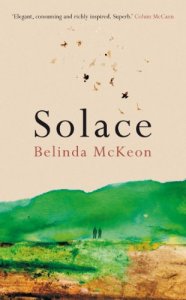Fiction – hardcover; Picador; 448 pages; 2015. Review copy courtesy of the publisher.
Several years ago I read Belinda McKeon’s debut novel, Solace, which explored the age-old (Irish) story of strained relationships between fathers and sons. In Tender, her second novel, she explores a different kind of relationship, that of friendship between men and women — in this case, two young adults, Catherine and James — and the pressure brought to bear on it by competition with peers, academic life, sexual politics and obsession.
Girl meets boy
It is 1997 and Catherine, who comes from a rural farming community, moves to Dublin from Longford to begin her studies in art history and English. James is a photography assistant, who has a room in a flat he shares with two school friends, Amy and Lorraine. When he gets a job with a big-shot photographer in Berlin, he moves out — and Catherine moves in. The pair, however, don’t meet until James returns on a temporary basis a few months down the line.
From the very start, their relationship is electric. Catherine doesn’t quite know how to take James, a street-wise drifter and struggling artist who has an air of mystery and the exotic about him. His often upfront, occasionally confrontational and extroverted attitude shocks and delights her in equal measure. Before long she’s rather infatuated with him.
And even though the story is told largely through Catherine’s eyes (albeit in the third person), it’s clear that James is equally enamoured of his new friend, and a kind of co-dependence kicks in.
That day in Dublin […] they had hugged goodbye at the station, and Catherine had wondered if she was meant to understand it, what was going on between them. Because something was going on. She felt so close to him already by that stage, and the phone calls that followed confirmed it; the way James spoke to her during the phone calls confirmed it. The directness. The openness. […] And now, during their phone calls, it was the same, and again, she felt herself wanting to scuttle away from it, somehow; from the way he told her he missed her, that he wanted to have her company again. Always she listened for the irony, for the trace of mockery, but it was never there; he was serious. He was saying aloud the stuff that, Catherine now realised, she had always thought you were meant to keep silent.
The book charts the relationship between James and Catherine over the course of a couple of intense years and then fast forwards to 2012 to explore the status of their friendship almost 15 years after their first meeting. Did it survive the ups and downs, and incredible strains placed upon it, all those years ago when they were teenagers?
Of course, I’m not going to reveal that here, because you need to read the book to find out for yourself. But let’s just say this is more than a boy-meets-girl story, for Tender is very much about what happens when you try to turn a friend into someone they’re not, when you project onto them feelings that can never truly be reciprocated.
It’s mainly about a young woman not being quite honest with herself, for Catherine loves the fact that she has a “special” friend because of the attention it garners her, but her naivety is alarming, as is her needy attitude, which quickly morphs into a self-destructive obsession.
Brilliant and believable characters
The superb characterisation is what makes this novel truly come alive — we’ve all known larger-than-life characters like James, and perhaps we’ve also known characters like Catherine, who is quiet and mousey but comes into her own in the company of someone else.
The further you read the story, the more absorbed you become by their claustrophobic relationship — I often felt like a voyeur looking in, almost embarrassed to share such close company with them, for their friendship is so interdependent and inward-looking, yet it morphs and changes over time. It took me quite a while to realise that Catherine is not a particularly nice person, however — her neediness, her selfishness, her desire to keep James to herself is cruel and heartbreaking to read about. She never truly allows James to be himself.
Catherine also lacks maturity, doesn’t know how to handle things, is out of her depth emotionally, and refuses to accept or acknowledge when she can’t have things her own way. It’s not that she’s a bad person, she has good intentions, but she lacks self-awareness and doesn’t realise the long-term repercussions of her behaviour.
The way in which McKeon gently exposes the cracks in their friendship is expertly paced. Indeed, this is the kind of book you sit down and get drawn in by — it’s hefty, weighing in at more than 400 pages, but I raced through it, completely absorbed by the story that unfolds in such beautiful, almost breathless, prose.
It’s full of quietly powerful, often joyful, sometimes excruciatingly painful, moments, perfectly capturing what it is like to be young and free for the first time in your life. Two months after having reached the final page I’m still thinking about these wonderfully drawn characters, released into a world where you must learn to stand on your own two feet regardless of the company you keep…


